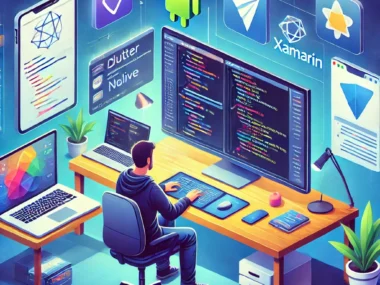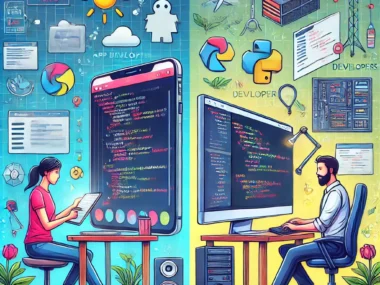Best app development software android and ios
Here are some of the best app development software options for creating Android and iOS apps:
1. Flutter
- Type: Open-source UI toolkit by Google
- Best for: Cross-platform development (Android, iOS, Web, Desktop)
- Language: Dart
- Pros:
- Single codebase for both platforms
- High-performance with native-like UI
- Large community support
- Cons:
- Large app size
- Limited native libraries (requires third-party plugins)
2. React Native
- Type: JavaScript framework by Meta (Facebook)
- Best for: Cross-platform mobile apps with web-like development
- Language: JavaScript (with JSX)
- Pros:
- Faster development with reusable components
- Large community and third-party libraries
- Cons:
- Performance may not be as good as native apps
- Requires third-party native modules for some features
3. Android Studio (for Native Android)
- Type: Official IDE for Android development
- Best for: Native Android app development
- Language: Java, Kotlin
- Pros:
- Best performance and optimization for Android
- Full access to Android features
- Cons:
- Requires separate development for iOS
- Can be resource-intensive
4. Xcode (for Native iOS)
- Type: Official IDE for iOS development
- Best for: Native iOS app development
- Language: Swift, Objective-C
- Pros:
- Best optimization for iOS
- Official Apple tools and frameworks
- Cons:
- Mac-only development
- No cross-platform support
5. Xamarin
- Type: Cross-platform development by Microsoft
- Best for: .NET developers wanting to build mobile apps
- Language: C#
- Pros:
- Single codebase with native performance
- Good for enterprise apps
- Cons:
- Slower performance compared to Flutter/React Native
- Large app size
6. SwiftUI
- Type: UI framework by Apple
- Best for: Modern native iOS/macOS development
- Language: Swift
- Pros:
- Declarative syntax with powerful UI design tools
- Better compatibility with newer Apple devices
- Cons:
- Limited support for older iOS versions
- Apple-exclusive
7. Apache Cordova
- Type: Hybrid app development framework
- Best for: Web developers who want to create mobile apps
- Language: HTML, CSS, JavaScript
- Pros:
- Uses standard web technologies
- Works across multiple platforms
- Cons:
- Performance issues for complex apps
- Limited access to native features
8. Ionic
- Type: Open-source mobile toolkit
- Best for: Hybrid and Progressive Web Apps (PWAs)
- Language: HTML, CSS, JavaScript (works with Angular, React, or Vue)
- Pros:
- Good for building web-based mobile apps
- Wide range of UI components
- Cons:
- Not as performant as native apps
- Dependency on web technologies
9. Unity (For Game Development)
- Type: Game development engine
- Best for: Mobile game development
- Language: C#
- Pros:
- Great for 2D and 3D game development
- Wide platform support
- Cons:
- Not ideal for non-gaming apps
- Can be resource-heavy
10. Appgyver
- Type: No-code/low-code development platform
- Best for: Beginners and non-coders
- Pros:
- Drag-and-drop interface
- No coding required
- Cons:
- Limited customization
- Not suitable for complex applications
Final Recommendation
- For cross-platform apps: Flutter or React Native
- For native Android apps: Android Studio (Kotlin)
- For native iOS apps: Xcode (Swift)
- For game development: Unity
- For no-code/low-code apps: Appgyver
Would you like help selecting the best tool for your specific needs?




